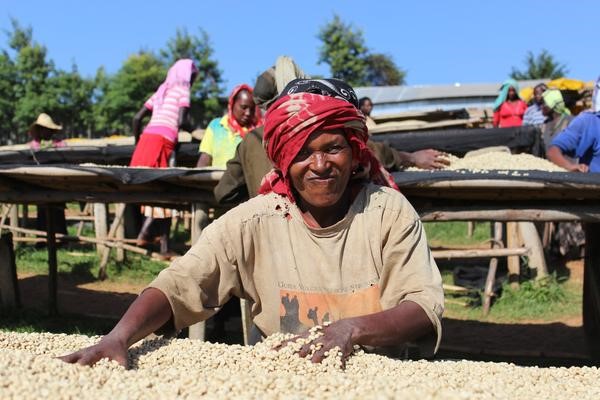Coffee producing areas in Ethiopia, a new trend of boutique development from cooperatives to single small farmers

Professional coffee knowledge exchange more coffee bean information please follow the coffee workshop (Wechat official account cafe_style)
Ethiopia Yega Xuefei producing area has become so famous that even Xiao 7's coffee has begun to use it. The details should not be introduced by the editor. However, there is a new trend in the Yega Sheffield system, that is, the development of a single small farmer and a single agricultural product. Let's share this new trend in Ethiopia with the new direction of the Waka Cooperative.
The editor first heard about this new development direction from the cup testing activities of the domestic raw bean trader Pebble Coffee and heard the lecture shared by the person in charge James before he began to inquire about the relevant information.
According to the Ethiopian decree, there are three types of coffee export systems:
(I) Private processing plants for export through ECX bidding
(II) Cooperative system
(3) single Manor system (Single Farm Project, SFP)
At present, most of these three export modes are still in the form of ECX transactions, and a few of them are through cooperatives or processing farms as direct trade, and single farms were hardly seen on the market three or four years ago.
However, after coming into contact with Berish farmers in the Waka Cooperative, we have seen the development of more and more single farms in the Yega and Guji producing areas.
In fact, the cooperative system is not bad, especially the internationally famous cooperatives such as Worka Cooperative, which produce mostly good beans.

The Waka Cooperative, founded in 2005, is located in a more remote part of the legal production area of Yega Snow Coffee, about 75 kilometers from the local coffee distribution center Dilla, while more than half of the coffee grown in Ethiopia belongs to the Garden Coffee type, that is, coffee is grown in a small area in its own backyard.
The Waka Cooperative is made up of 305 farmers, with a total planting area of about 763 hectares and an annual output of nearly 460 tons. The scale is not too large, but the members of the cooperative have strong cohesion and good quality, so they are often good goods, and even collectively apply for organic certification, but in the final analysis, the coffee cherries handled by the cooperative still come from a large number of small farmers, and the product curriculum vitae can not be traced back to a single producer. Therefore, such a so-called traceable source is accompanied by a vague dilemma, and the occasional occurrence of rat shit will destroy the trust of the co-operative. This continuous extension of traceability has also led to the launch of a single smallholder batch by the Waka Cooperative.
In fact, the single farm system (Single Farm Project, referred to as SFP) has always existed in Ethiopia, but its proportion is not high. In addition, in the past, there were a large number of commercial batches that did not attach importance to quality, so the type of single farm has not been favored by various farm owners, so the proportion of development cannot be increased for a long time.

However, with the third wave of boutique coffee in the past 20 to 30 years, Ethiopian coffee has emerged in the market. coupled with the fact that there were some strong Ethiopian coffee operators in Europe and the United States in the past, they began to return to Ethiopia to operate coffee (the chairman of ECX is the scaa of the United States). This craze has also sowed the seeds of influence in the country of clothing after being baptized by the culture of the western coffee market, and has also brought new changes to the industry. According to the account of the coffee hunter, many local farmers have devoted themselves to the management of a single farm, and recently they have even led to an upsurge of returning from Europe and the United States to their hometown. Ethiopian coffee beans will be more interesting!
Important Notice :
前街咖啡 FrontStreet Coffee has moved to new addredd:
FrontStreet Coffee Address: 315,Donghua East Road,GuangZhou
Tel:020 38364473
- Prev

The Story of Sumatran Coffee beans with the characteristics of aged Mantenin for more than ten years
Professional coffee knowledge exchange more coffee bean information please follow the coffee workshop (Wechat official account cafe_style) Starbucks Sumatra coffee beans introduce Starbucks Sumatra coffee beans how long should the shelf life of coffee beans be? Brand coffee beans generally set a shelf life, which is usually 1-2 years. Coffee beans usually have a shelf life of 1-2 years, but
- Next

What are the characteristics of Sumatran coffee? stories about the origin and name of Sumatran coffee
Professional coffee knowledge exchange more coffee bean information please follow the coffee workshop (Wechat official account cafe_style) Sumatran coffee taste and flavor with similar food coffee country profile what are the characteristics of Sumatran coffee? Sumatran coffee is produced in Sumatra, Indonesia, Asia, also known as Sumatran coffee. Her flavor is very rich, fragrant, bitter, mellow, with
Related
- Does Rose Summer choose Blue, Green or Red? Detailed explanation of Rose Summer Coffee plots and Classification in Panamanian Jade Manor
- What is the difference between the origin, producing area, processing plant, cooperative and manor of coffee beans?
- How fine does the espresso powder fit? how to grind the espresso?
- Sca coffee roasting degree color card coffee roasting degree 8 roasting color values what do you mean?
- The practice of lattes: how to make lattes at home
- Introduction to Indonesian Fine Coffee beans-- Java Coffee producing area of Indonesian Arabica Coffee
- How much will the flavor of light and medium roasted rose summer be expressed? What baking level is rose summer suitable for?
- Introduction to the characteristics of washing, sun-drying or wet-planing coffee commonly used in Mantenin, Indonesia
- Price characteristics of Arabica Coffee Bean Starbucks introduction to Manning Coffee Bean Taste producing area Variety Manor
- What is the authentic Yega flavor? What are the flavor characteristics of the really excellent Yejasuffi coffee beans?

